The Jordanaires

 In music, there is such a thing as a “beautiful contradiction”. Such terminology was one of many grand definitions of The Jordanaires. They accrued no Gold or Platinum-certified albums of their own, but they have appeared on more multi-million-selling records than perhaps any other musical artist in the world. They were a straight-laced group of gentlemen who left the competitive gospel music industry, only to soon after back Elvis Presley. Much of the career of the Jordanaires has been spent in the background of other artists, yet the Jordanaires have attained accolades that few groups in gospel music could even dream of. In the mid 1950s, a prominent Nashville producer told them, “Forget about the Hit Parade. Stars are here today and gone tomorrow. We need good backup singers!” The Jordanaires heeded this advice, and had consistent work every day for the next quarter century. Being in the background afforded the Jordanaires one of the greatest and most storied careers of any quartet, in any genre of music. This has unfortunately and unintentionally placed them in the back of the minds of many gospel quartet fans, rather than in the forefront. It is my hope that this article may once again remind us of the true greatness that was The Jordanaires.
In music, there is such a thing as a “beautiful contradiction”. Such terminology was one of many grand definitions of The Jordanaires. They accrued no Gold or Platinum-certified albums of their own, but they have appeared on more multi-million-selling records than perhaps any other musical artist in the world. They were a straight-laced group of gentlemen who left the competitive gospel music industry, only to soon after back Elvis Presley. Much of the career of the Jordanaires has been spent in the background of other artists, yet the Jordanaires have attained accolades that few groups in gospel music could even dream of. In the mid 1950s, a prominent Nashville producer told them, “Forget about the Hit Parade. Stars are here today and gone tomorrow. We need good backup singers!” The Jordanaires heeded this advice, and had consistent work every day for the next quarter century. Being in the background afforded the Jordanaires one of the greatest and most storied careers of any quartet, in any genre of music. This has unfortunately and unintentionally placed them in the back of the minds of many gospel quartet fans, rather than in the forefront. It is my hope that this article may once again remind us of the true greatness that was The Jordanaires.
 The origins of The Jordanaires actually trace back to the early 1940s, when Bill, Monty, Jack, and Matt Matthews joined together in forming The Matthews Brothers in Poplar Bluff, Missouri. The group later changed its name to The Foggy River Boys. The quartet dominated the radio airwaves, with not one, but two daily live shows KWTO-AM in Springfield, Missouri. In 1947, they appeared on the Grand Ole Opry’s Prince Albert Show with country music mega-star, Red Foley. All ordained ministers, brothers Jack and Matt decided to leave the road and enter full-time ministry in 1948. Therefore, the remaining Matthews brothers regrouped, hiring lead vocalist Bob Hubbard and bass vocalist Culley Holt. The group changed their name as well, branding themselves originally as The Melodizing Matthews, soon wisely changing their name one final time to The Jordanaires.
The origins of The Jordanaires actually trace back to the early 1940s, when Bill, Monty, Jack, and Matt Matthews joined together in forming The Matthews Brothers in Poplar Bluff, Missouri. The group later changed its name to The Foggy River Boys. The quartet dominated the radio airwaves, with not one, but two daily live shows KWTO-AM in Springfield, Missouri. In 1947, they appeared on the Grand Ole Opry’s Prince Albert Show with country music mega-star, Red Foley. All ordained ministers, brothers Jack and Matt decided to leave the road and enter full-time ministry in 1948. Therefore, the remaining Matthews brothers regrouped, hiring lead vocalist Bob Hubbard and bass vocalist Culley Holt. The group changed their name as well, branding themselves originally as The Melodizing Matthews, soon wisely changing their name one final time to The Jordanaires.
 The Original Jordanaires consisted of Bill Matthews – Tenor, Bob Hubbard – Lead, Monty Matthews – Baritone, Culley Holt – Bass, and Bob Money – Pianist. Their sound was very much influenced by the popular Black gospel quartets of the day, particularly the Golden Gate Quartet. While most of the White quartets were singing from the latest convention books, the Jordanaires performed hand-clapping spirituals with both precision and fervor. Moving from Missouri to Nashville in 1949, the group immediately secured a spot as regulars on the Grand Ole Opry. Their first single was released on RCA Victor in 1950. The song? It was a little hand-clapper written by bass singer Culley Holt entitled, “I’m Gonna Walk Dem Golden Stairs”. The Jordanaires recorded several gospel and country sides for both RCA and Decca Records, and in 1951, signed with Capitol Records, where they remained for the rest of the 1950s.
The Original Jordanaires consisted of Bill Matthews – Tenor, Bob Hubbard – Lead, Monty Matthews – Baritone, Culley Holt – Bass, and Bob Money – Pianist. Their sound was very much influenced by the popular Black gospel quartets of the day, particularly the Golden Gate Quartet. While most of the White quartets were singing from the latest convention books, the Jordanaires performed hand-clapping spirituals with both precision and fervor. Moving from Missouri to Nashville in 1949, the group immediately secured a spot as regulars on the Grand Ole Opry. Their first single was released on RCA Victor in 1950. The song? It was a little hand-clapper written by bass singer Culley Holt entitled, “I’m Gonna Walk Dem Golden Stairs”. The Jordanaires recorded several gospel and country sides for both RCA and Decca Records, and in 1951, signed with Capitol Records, where they remained for the rest of the 1950s.
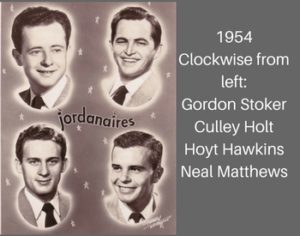 Like many quartets of that era, the early Jordanaires encountered their share of frequent changes. Former John Daniel Quartet pianist Gordon Stoker replaced keyboardist Bob Money at the end of 1950, but by October 1951, Stoker found himself in the tenor position upon the departure of Bill Matthews. In early 1952, Bob Hubbard was drafted into the Army, and was replaced by Hoyt Hawkins. Monty Matthews soon followed his brother in October 1952. Ever the versatile musician, Stoker assumed the lead position while Hawkins dropped to baritone, and Don Bruce was recruited as first tenor. The group used several pianists during this era, including Bob Money, Boyce Hawkins, and Marvin Hughes, the latter of whom performed for the group on their Opry appearances. Since the Matthews Brothers still owned the name “Jordanaires”, the group was contractually obligated to use a different name. The group briefly traveled as The Foggy River Boys, and also used the name “The Gordonaires” when appearing as backup vocalists on the Eddy Arnold Time TV show. By March 1953, all was well once again and the quartet was permanently The Jordanaires. The personnel by this time was Culley Holt – Bass, Hoyt Hawkins – Baritone, Neal Matthews – Lead, and Gordon Stoker – Tenor.
Like many quartets of that era, the early Jordanaires encountered their share of frequent changes. Former John Daniel Quartet pianist Gordon Stoker replaced keyboardist Bob Money at the end of 1950, but by October 1951, Stoker found himself in the tenor position upon the departure of Bill Matthews. In early 1952, Bob Hubbard was drafted into the Army, and was replaced by Hoyt Hawkins. Monty Matthews soon followed his brother in October 1952. Ever the versatile musician, Stoker assumed the lead position while Hawkins dropped to baritone, and Don Bruce was recruited as first tenor. The group used several pianists during this era, including Bob Money, Boyce Hawkins, and Marvin Hughes, the latter of whom performed for the group on their Opry appearances. Since the Matthews Brothers still owned the name “Jordanaires”, the group was contractually obligated to use a different name. The group briefly traveled as The Foggy River Boys, and also used the name “The Gordonaires” when appearing as backup vocalists on the Eddy Arnold Time TV show. By March 1953, all was well once again and the quartet was permanently The Jordanaires. The personnel by this time was Culley Holt – Bass, Hoyt Hawkins – Baritone, Neal Matthews – Lead, and Gordon Stoker – Tenor.
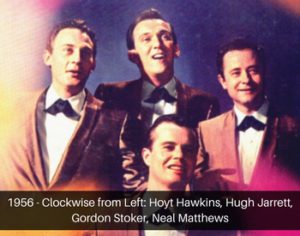 It was during this time that the Jordanaires entered their greatest era as recording artists. Whether with a rousing spiritual like “Dig a Little Deeper” or “Journey to the Sky”, or their beautiful quartet rendition of Hank Williams’ “House of Gold”, it had the unique vocal touch that was The Jordanaires. One afternoon following their performance at an Eddy Arnold concert, they visited a young, inexperienced vocalist getting his start in the music business. The singer offered the quartet something they had been promised many times, but rarely took seriously, “If I ever get a recording contract with a major company, I want you guys to back me up.” True to his word, Elvis Presley used the Jordanaires as his backup vocalists on recordings from late 1956 through 1970, and took them with him as part of his entourage.
It was during this time that the Jordanaires entered their greatest era as recording artists. Whether with a rousing spiritual like “Dig a Little Deeper” or “Journey to the Sky”, or their beautiful quartet rendition of Hank Williams’ “House of Gold”, it had the unique vocal touch that was The Jordanaires. One afternoon following their performance at an Eddy Arnold concert, they visited a young, inexperienced vocalist getting his start in the music business. The singer offered the quartet something they had been promised many times, but rarely took seriously, “If I ever get a recording contract with a major company, I want you guys to back me up.” True to his word, Elvis Presley used the Jordanaires as his backup vocalists on recordings from late 1956 through 1970, and took them with him as part of his entourage.
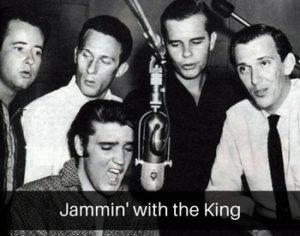 The Jordanaires soon found themselves working regularly as background vocalists in the studio, two to four sessions per day, six days per week. Marty Robbins’ “White Sportcoat”, Patsy Cline’s “Crazy”, Conway Twitty’s “It’s Only Make Believe”, “The Battle of New Orleans” by Johnny Horton, and numerous other groundbreaking hits all featured the Jordanaires’ smooth harmonies. If a female vocalist was ever required in these sessions, Millie Kirkham would join her beautiful soprano voice with the quartet, thus the mixed background vocals on Ferlin Husky’s “Gone”, and Elvis’ “Blue Christmas”. With such a staggering schedule for recording new songs, lead vocalist Neal Matthews devised a technique around 1957 to help the group learn the harmonies in quicker timing, where instead of a typical chord chart with notes, the group would use a number system, thereby not requiring them to commit as many charts to memory. This technique was quickly picked up by the rest of the Nashville A-List musicians, and the Nashville Number System soon became a studio standard.
The Jordanaires soon found themselves working regularly as background vocalists in the studio, two to four sessions per day, six days per week. Marty Robbins’ “White Sportcoat”, Patsy Cline’s “Crazy”, Conway Twitty’s “It’s Only Make Believe”, “The Battle of New Orleans” by Johnny Horton, and numerous other groundbreaking hits all featured the Jordanaires’ smooth harmonies. If a female vocalist was ever required in these sessions, Millie Kirkham would join her beautiful soprano voice with the quartet, thus the mixed background vocals on Ferlin Husky’s “Gone”, and Elvis’ “Blue Christmas”. With such a staggering schedule for recording new songs, lead vocalist Neal Matthews devised a technique around 1957 to help the group learn the harmonies in quicker timing, where instead of a typical chord chart with notes, the group would use a number system, thereby not requiring them to commit as many charts to memory. This technique was quickly picked up by the rest of the Nashville A-List musicians, and the Nashville Number System soon became a studio standard.
 In 1955, Hugh Jarrett replaced Culley Holt as bass vocalist. The Jordanaires released two of gospel music’s greatest quartet albums during the late 1950s, Heavenly Spirit (featuring Jarrett) and Gloryland. By the time the Gloryland album was recorded, Ray Walker had stepped into the bass position. From April 1958 until Hoyt Hawkins’ death in October 1982, the Jordanaires personnel remained unchanged.
In 1955, Hugh Jarrett replaced Culley Holt as bass vocalist. The Jordanaires released two of gospel music’s greatest quartet albums during the late 1950s, Heavenly Spirit (featuring Jarrett) and Gloryland. By the time the Gloryland album was recorded, Ray Walker had stepped into the bass position. From April 1958 until Hoyt Hawkins’ death in October 1982, the Jordanaires personnel remained unchanged.
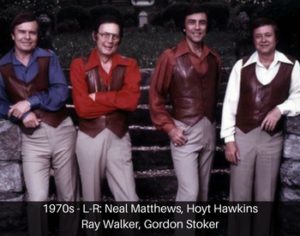 The group slowed down as Hoyt Hawkins’ health began failing in the 1970s, thereby requiring them to recruit fill-in vocalists when necessary. Duane West, who was an original member of Sonny James’ Southern Gentlemen, and Louis Nunley, who had previously performed with the Anita Kerr Singers, were both outstanding vocalists, and filled in whenever needed. Upon Hawkins’ passing in 1982, West became the group’s permanent baritone singer. Nunley filled in at both bass and baritone positions when needed during the 1980s, and when West became ill in 1999, Nunley finally joined the group permanently. It was a tragic blow to the group when longtime lead vocalist Neal Matthews passed away on April 21, 2000. Well-known and respected Nashville singer Curtis Young, who had performed background vocals on quite a few mega-hits himself, assumed the lead position.
The group slowed down as Hoyt Hawkins’ health began failing in the 1970s, thereby requiring them to recruit fill-in vocalists when necessary. Duane West, who was an original member of Sonny James’ Southern Gentlemen, and Louis Nunley, who had previously performed with the Anita Kerr Singers, were both outstanding vocalists, and filled in whenever needed. Upon Hawkins’ passing in 1982, West became the group’s permanent baritone singer. Nunley filled in at both bass and baritone positions when needed during the 1980s, and when West became ill in 1999, Nunley finally joined the group permanently. It was a tragic blow to the group when longtime lead vocalist Neal Matthews passed away on April 21, 2000. Well-known and respected Nashville singer Curtis Young, who had performed background vocals on quite a few mega-hits himself, assumed the lead position.
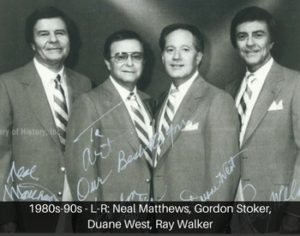 Walker, Nunley, Young, and Stoker comprised the final lineup of The Jordanaires. During this era, the group remained a conscious presence in the music industry. They were awarded numerous accolades for their influence in music, including induction into the Gospel Music Hall of Fame (1999), Rockabilly Hall of Fame (2000), Country Music Hall of Fame (2001), and Vocal Group Hall of Fame (2004). In 2006, Gordon Stoker was inducted into the Southern Gospel Music Piano Roll of Honor at the Grand Ole Gospel Reunion.
Walker, Nunley, Young, and Stoker comprised the final lineup of The Jordanaires. During this era, the group remained a conscious presence in the music industry. They were awarded numerous accolades for their influence in music, including induction into the Gospel Music Hall of Fame (1999), Rockabilly Hall of Fame (2000), Country Music Hall of Fame (2001), and Vocal Group Hall of Fame (2004). In 2006, Gordon Stoker was inducted into the Southern Gospel Music Piano Roll of Honor at the Grand Ole Gospel Reunion.
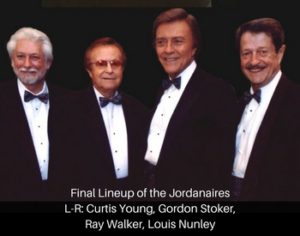 After more than sixty incredible years, the vocal sound of the Jordanaires was silenced permanently upon the passing of Gordon Stoker on March 27, 2013. Although they broke practically all genres in the golden age of music, the Jordanaires’ gospel influence is all over many of today’s top vocal groups. Their contributions, whether in the limelight or in the background of other entertainers, must never be forgotten.
After more than sixty incredible years, the vocal sound of the Jordanaires was silenced permanently upon the passing of Gordon Stoker on March 27, 2013. Although they broke practically all genres in the golden age of music, the Jordanaires’ gospel influence is all over many of today’s top vocal groups. Their contributions, whether in the limelight or in the background of other entertainers, must never be forgotten.
Thank you, as always, for your kind words, emails, and private messages in regard to this column! I will gladly try to answer any questions or requests at my email – alan@alankendallmusic.com. Be sure to visit my website at www.alankendallmusic.com. I would love to see each and every one of you at any one of my concert appearances! See you soon!

